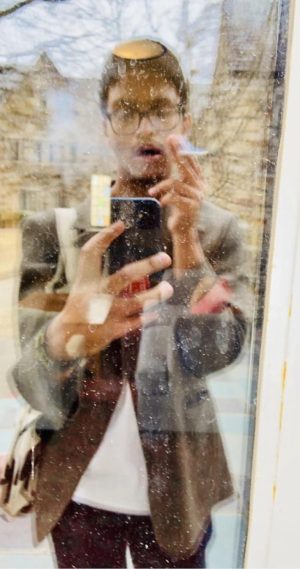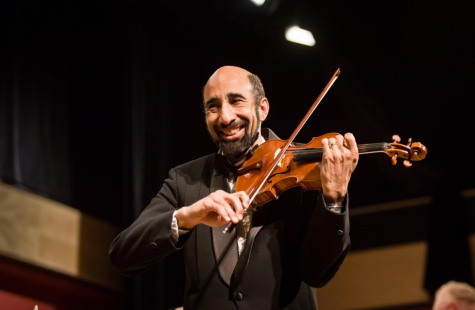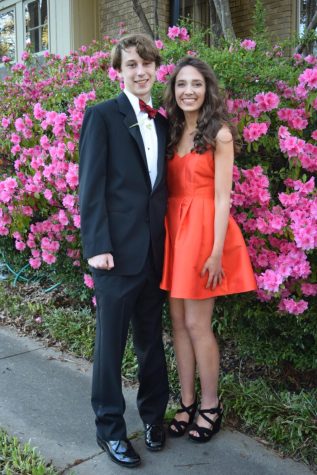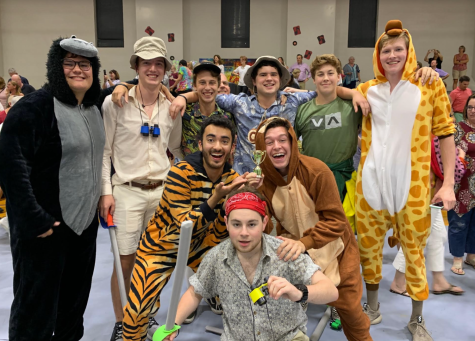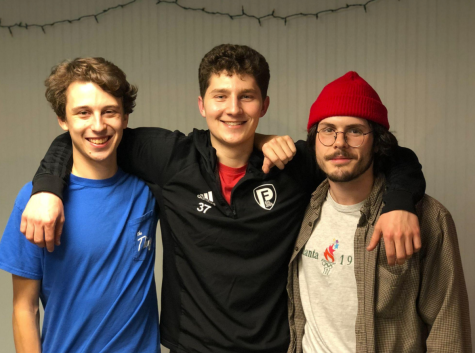Roads taken
December 17, 2019
The Women’s Therapeutic Residential Center (WTRC), the euphemistic name given to the women’s complex in the West Tennessee State Penitentiary (WTSP), sits about an hour and a half (depending on who’s driving) northeast of Rhodes in a town called Henning. Google says that Henning has a population of 945, a total which apparently does not include inmates, one more way in which the residents of the WTRC have disappeared.
It is a surprising place to find Rhodes faculty and students. I first heard about Rhodes’s program with the Center last spring, when speaking to Professor Steven Haynes about the retiring of Palmer Hall. Professor Haynes established the program in 2016 after teaching a GED course at the Shelby County Jail. The WTRC class began as a kind of Great Books reading club, and became accredited in 2019. The women in the program (who, like all Rhodes students, have to apply to take the course) will take four semesters of a Search-like class and receive a liberal arts certificate once they graduate.
I knew I wanted to write about the program as soon as he described it, but it took me until November to actually make the trek out there with him, along with the class TA Madison Zickgraf ’21. The class also has three student volunteers, Snow Perrin ’22, Rita Johnson ’22, and Erin Osborne ’22.
“Mass incarceration and prison as an institution has always left me feeling angry and hopeless. Because the issue is so large, I felt as though I had no ability to change anything about it,” Snow told me. The program was a way that she might make a difference.
It was dark by the time we left campus and I stared out the car windows like an excited child. By contrast, the other girls seemed steady veterans of a program in which I was about to receive my first lessons. There was something sad and romantic, even Faulknerian about the convenience stores and gas stations whose lights glittered on either side of the road. The place we were going wasn’t quite real. As the road began to twist and the landscape morphed into rolling hills, I grew nervous. I felt compelled to fill the quiet with the sound of my own voice and started talking about nothing in particular. “I tend to talk and just not stop,” I explained at one point, half-embarrassed.
“Really? I couldn’t tell that about you,” Professor Haynes said.
The cotton fields that lined Highway 51 reminded me of summers spent in Northeast Arkansas, but I’d never seen a sky like the one that hung over Henning. It glowed as it darkened and faded to a pink I found somehow disturbing: it reminded me of rotting fruit. I pointed out the strangeness of the sky and no one responded.
We arrived at the prison about 15 minutes late, and regrettably I was the reason. Professor Haynes and his wife had had to trade cars to accommodate an extra passenger—me. Outside the entrance stood three flags: one for Tennessee, one for the United States, and one for the Tennessee Department of Corrections.
Madison gave me a rundown on how the security screening would go. “They don’t allow clicker pens because they think the women can take them apart and use them to give each other tattoos,” she explained. I wanted to point out that you can take apart a non-clicker pen too, but figured that no one needed my thoughts. I did need what Madison, Snow, Rita, and Erin knew and thought. We visitors had to take off our coats and shoes and pass through a metal detector. Being patted down made me acutely self-conscious despite the guard’s professionalism. Snow and Rita joked about Snow’s leggings—leggings are also not allowed and they were surprised Snow had gotten through.
As I waited in line to be screened, I watched as different slides flashed across a monitor, mostly with messages about how to be professional with inmates. Then, a glittery pink butterfly against a black background appeared. Thank You! it read. Have a Nice Day! In the corner was the website credit: blingee.com. It was so absurd I fought not to laugh. Surrounding the facility were fences that towered over us. Should anyone have felt brave enough to attempt to climb over them, the two rows of concertina wire would have dissuaded them. Nice day indeed.
After we all had our belongings and our persons checked, the woman at the desk stamped my hand to confirm I’d passed through security with what I would later learn was UV-light visible ink. “You can’t really see it,” I said stupidly as we walked to the next checkpoint.
“They’ll see it under the light,” Madison told me. And they did, after we forfeited our driver’s licenses and passed on to what the prison called “Ed Site 1.”
Ed Site 1—a room with a few tables and chairs arranged into groups—was cheerfully decorated. Construction paper fall leaves hung from the ceiling tiles. On the chalkboard someone had written in curving script, “Culinary Skills Class.” On the opposite wall hung framed decorated aprons, one apparently designed by a KISS fan.
The women filed in and took their seats, talking loudly and warmly to each other and to Madison, Snow, Rita, and Erin, for whom it was clear they felt an immense affection. On Thursdays, the day of my first visit, the women study in small groups. Mondays are reserved for lectures. I first sat down with Snow and listened to the women talk about how they missed her—she had been gone the last couple of weeks. “We love Snow,” one of them informed me. An older woman strode in, took a seat beside me, and introduced herself as Dana. (The women’s names have been changed to protect their privacy.) Dana is the editor of the WTRC’s newspaper and reads a book a day, one of which she reviews for each edition of the paper. My Search professor, Professor Brunt, taught at the program last semester and had brought them copies of his wife’s, Professor Benz, book of short stories, The Man Who Shot Out My Eye Is Dead. Dana reviewed each of them, not always favorably.
The day I visited, the women were studying for their second midterm on the Old Testament. A few weeks earlier they had taken one on the Iliad, which Professor Morrell had taught them. Their class average was within a few points of that of Professor Morrell’s class at Rhodes. Most of the women I spoke to said he was their favorite professor: tough but kind.
The only woman not studying with her classmates was Nicole, who I later learned had been away for six weeks waiting to get her wisdom teeth removed. For serious medical procedures, inmates at the WTSP have to go to Nashville. Nicole’s original appointment had been delayed and so she had to wait over a month in a strange facility. Prison officials allowed her to bring one book with her. She had tried to bring the Iliad to study for her exam, but they would only let her bring her copy of the Bible with her. Nicole had her mother mail her a copy of the Iliad, and her classmates wrote to keep her updated on the class. Nicole sent messages through them to Madison and Professor Haynes, telling them she was studying and doing her reading. “I think she was scared she was going to get kicked out because she was gone,” Madison told me.
“I never finished a book until this class,” one of the women told me, holding up a copy of Euripides I. “This was the first book I finished in my life.” I was embarrassed to remember that the first book I ever finished was Junie B. Jones.
I sat down at a table with a woman named Anne, who had evidently been anticipating my questions. “Gimme what you got,” she answered when I asked if I could talk to her.
“The class has given me a sense of pride,” Anne told me. “I speak better. I don’t use so much slang no—” she stopped and corrected herself before she completed the mistake she was about to make. “I don’t use as much slang anymore.”
Marie, another woman in Annie’s group, agreed. “I love learning. It means a lot to me, young people coming in and talking to us and teaching us. It makes me want to be a better person, and live amongst people like Erin.” Marie spoke with such sincerity and urgency I began to cry. She told me that the class is helping her learn how to write and speak, that she wants to be an advocate for other prisoners and for victims of domestic violence.
“I love you guys,” Erin said. The women told her they loved her, too.
As the class came to an end, a woman named Ashley asked me if I was coming back. I said yes without thinking about it—the Great Books students had utterly charmed and moved me. I had trouble sleeping that night, turning over and over in my mind the things they had said.
I went back to the WTRC the following Monday with Professor Jansen and Professor Morrell, as well as Madison. Freezing rain was falling as we entered the compound and one of the women who moved us through the security checkpoint told us we might want to leave early, and not to goof off.
“What does she think we’re doing in there? We’re providing an education,” Madison said as we stepped outside.
As soon as we entered the classroom the women began to tease Professor Morrell and complain good-naturedly about the difficulty of his exam. Professor Jansen was teaching that night and had a quiz on Herodotus for them.
“Is it gonna be like his quizzes?” One woman asked, pointing at Professor Morrell. He had told me that he only changes his curriculum for the WTRC insofar as he must concede to the limitations of the prison, like being unable to email his WTRC students.
“They’re just as capable of doing the work,” he said when I asked him why. They seemed to take pride in being treated like Rhodes students, which, as the professors would insist, they are.
Dana sat next to me at the table—the media has to stick together—and began asking me questions about politics, about the Ukraine whistleblower and who will win the 2020 election. “I think Trump’s gonna win again,” she told me in a tone that made it clear she disapproved. “I don’t think anyone cares.”
As soon as class began, the women burst into conversation, quoting directly from Herodotus and speaking over each other in their eagerness. They were especially interested in King Caundales’s wife, why she goes unnamed and why Caundales sought to disrobe her. “He wants a trophy wife,” one woman, Ivy, informed us.
“I think the king is kind of a whore,” Ivy said so matter-of-factly that I did not question her impression. Some of the women insisted that the shamed queen was not a victim but the architect of Caundales’s murder by Gyges.
At one point during the class, Marie asked if Madison was okay, concerned about Madison’s quietness. Madison, who had been grading their quizzes at a separate table, said she was. “Okay, just checking,” Marie said with a smile. The class seemed satisfied and moved on.
I had tried not to have expectations of the women when I visited the WTRC, to be the objective reporter I want to be, and had mostly failed. I was completely taken by these women, these intelligent, funny, vulgar women. I could perceive why Professor Haynes, despite not having a long history of inmate advocacy, would work as hard as he does to demonstrate to fellow faculty and administrators the value of the program.
“They see why it’s a good thing to do, but they don’t see why we should spend our resources on it,” Professor Haynes told me on the trip back to Rhodes after my first visit. Consequently, he funds the program himself. Madison had set up a GoFundMe page for the program, but the Development Office asked her to take it down.
When I asked the women about the previous classroom experience they had, they told me about their carpentry and computer classes. They told me they were useful but did not compare to their Rhodes class, how the professors and TAs treat them with kindness and respect: “like real people,” Marie said. They are learning to understand each other and the world through reading and writing about it. Their study of the humanities is restoring some measure of their dignity, the very thing prisons aim to strip from their inmates.





